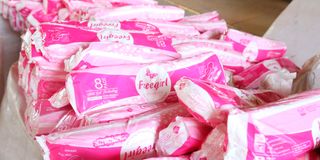Where are the free pads for schoolgirls?

What you need to know:
- An Auditor General's report revealed severe underfunding in Kenya's free sanitary towels program for schoolgirls.
- The Ministry of Education only provided an average of three packets per girl annually instead of the required nine packets due to budget constraint.
- The shortage has forced many girls to resort to unhygienic alternatives, engage in risky behavior to obtain pads, miss classes, or drop out of school altogether.
A report by the Auditor General has exposed the severe underfunding plaguing Kenya's free sanitary towels program for schoolgirls, forcing many, especially in rural areas, to drop out due to inadequate access to menstrual hygiene products.
Despite the government spending nearly Shh4 billion from 2013 to 2023 to provide pads to 12.6 million students nationwide, the audit reveals a critical gap.
"A review of the distribution lists indicated that the quantities of sanitary towels issued to girls in primary and secondary schools were insufficient to last them for the period they were in school," the report states.
On average, the Ministry of Education provided just three packets per girl yearly, a mere 42 per cent of their annual nine-packet entitlement.
"The ministry provided seven packets of sanitary towels per girl or year, as opposed to the required nine packets. This was attributed to budgetary constraints."
The performance audit, conducted between 2019 and 2023 in 44 schools, examined the budgetary allocation and implementation of the program mandated by the 2017 Basic Education Amendment Act to provide free, sufficient sanitary towels to every girl who has reached puberty. However, the findings were damning.
"For instance, the total girls' enrolment in Class Six, Seven and Eight in the financial year 2021/2022 was 1,675,299, which means the Ministry of Education required a budget of 621,200,869 to procure nine packets...However, an amount of Sh259,092,503 was allocated, resulting in a deficit of Sh362,108,365," highlighting the massive funding shortfall.
Auditor General Nancy Gathungu, revealed that budgetary constraints forced the ministry to provide only seven instead of the required nine packets per girl yearly.
"Therefore, girls received an average of 3.75 packets per year, which represents 42 per cent of their annual entitlement," the report notes.
Inconsistent funding further exacerbated the issue, with allocations increasing one year, but drastically decreasing the next, despite growing enrolment numbers. In some instances, entire classes missed out on receiving sanitary towels due to shortages.
The consequences have been severe, with the report noting many girls resort to unhygienic alternatives like "pieces of cloth or blankets, risking infections and discomfort" during their periods.
Interviews revealed a staggering 59 per cent of 452 girls used two or more packets monthly due to heavier flows, exacerbating supply shortfalls.
In dire circumstances, some girls were forced to "share sanitary towels with relatives and friends" or even "engage in sexual activities in exchange" for pads, risking diseases and eventual dropout from school. Irregular deliveries and a lack of disposal bins in schools further compounded the issues.
Menstrual health
However, in areas where the supply was sufficient, the program proved beneficial.
"Interviews revealed that prior to the...programme, girls' attendance...was irregular, compared to...boys. This has since changed as girls can now access sanitary towels when in school," the report stated.
To address the glaring gaps, the Auditor General recommended urgent increase of budgetary allocations and establishment of clear standards on the quantities of pads to be issued. Improved monitoring, evaluation systems, and ensuring timely deliveries, especially to remote schools, are also critical.
The report serves as a wake-up call for Kenyan authorities to prioritise menstrual health and girls' education. Adequate funding and efficient implementation of the free sanitary towels program are vital to keeping girls in school and upholding their dignity during menstruation.
Additionally, the audit revealed other issues like a lack of training for teachers and students on menstrual hygiene management, and discrepancies between enrolment data used for allocation and actual distribution lists. Some head teachers lacked facilitation to collect pads from sub-county offices, forcing them to fund travel from personal, limited resources.





